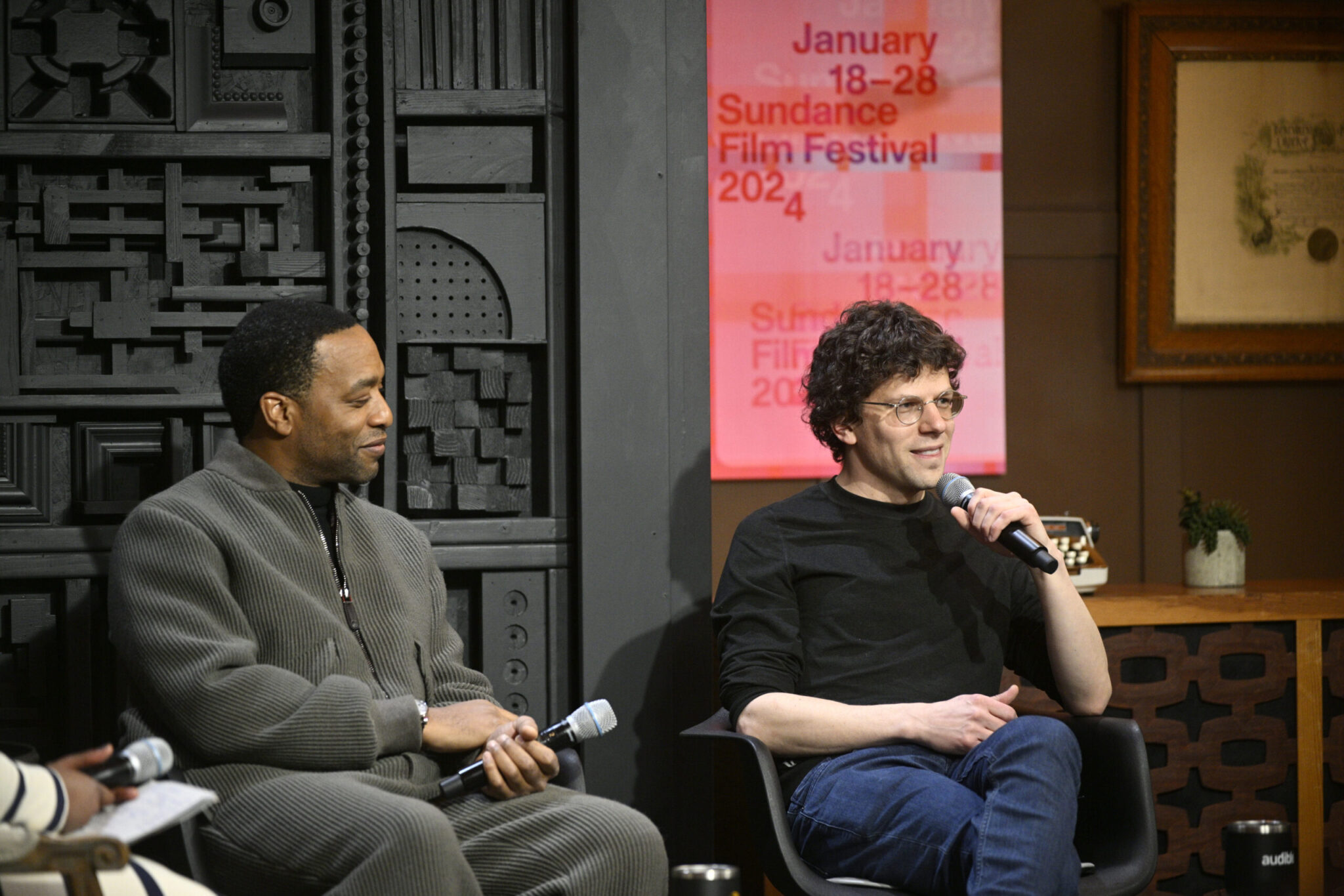Chiwetel Ejiofor and Jesse Eisenberg (Photo by Stephen Greathouse/Shutterstock for Sundance Film Festival)
By Lucy Spicer
Filmmaker Lodge was packed with a lengthy line of hopefuls outside to attend a much-anticipated edition of Cinema Café on January 21. Special guests and writer-directors Jesse Eisenberg and Chiwetel Ejiofor were in attendance to discuss their sophomore features premiering at the 2024 Sundance Film Festival, A Real Pain (recently acquired by Searchlight Pictures for $10 million) and Rob Peace, respectively.
Both Eisenberg and Ejiofor are longtime Sundance alums in an acting capacity — Eisenberg’s first Festival film was The Squid and the Whale in 2005, and Ejiofor’s was 2006’s Kinky Boots — who then went on to premiere their debut features at the Festival as well (Eisenberg’s When You Finish Saving The World and Ejiofor’s The Boy Who Harnessed the Wind).
Angelique Jackson, senior entertainment writer at Variety, guided the lively conversation, which had the audience hanging on the filmmakers’ every word (spoken at signature lightning speed in Eisenberg’s case). Topics of conversation included varying aspects of the filmmakers’ 2024 Festival films, as well as their experiences balancing the roles of actor and director.
Read on to discover some of our favorite quotes from the event.
Ejiofor on the relatability of Rob Peace’s story:
“I think it’s about the idea of empathy and generating empathy and generating understanding in areas that, for some reason, felt very dismissed. Rob’s journey is this incredibly complex journey that he goes through. These systems that he’s dealing with — fighting against, in many ways — these intersections of his relationship to the criminal justice system, housing, education, things that eventually sort of conspire to kind of destroy him. And that journey, I think, is something that has been typically sort of patronized in some ways. People aren’t as empathetic as they could be to the struggles that people are facing, to marry all of these different aspects of their lives together, the responsibilities that they’re taking on, and the pressures that they’re taking on and the pressures that are put upon them. So I think that there’s something that’s obviously very specific to Rob and his community and his family and the richness of all of those things, but I think there’s something that is very relatable in a much wider context. I think that’s really what spoke to me about the film.”

Eisenberg on A Real Pain resonating with diverse audiences:
“The movie is very personal, up to the locations where we shot, which used to be where my family lived in 1939. The movie is very personal, oftentimes autobiographical, and yet my hope with the movie, my main hope and concern is that it transcends the kind of niche world that I’m speaking about — my specific culture, my specific generation, my specific geographical ancestry. My hope is that the movie can transcend that and speak to the wider feeling of being curious about your past, trying to reconcile your home life with your family’s trauma, and seeing how that kind of trauma, that global trauma, can get passed down into modern life and still have a kind of horrible ripple effect.”
Ejiofor on acting in a movie he’s also directing:
“You have to give yourself a break with some of the stuff. It’s too much. It’s too much to do. As an actor, it’s like the polar opposite part of your mind. You want to take your time, you want to get there, feel your way into the scene, you wanna take as many takes as you need to kind of nail it, you know? And the director is like, ‘We’ve gotta get out of here, because we’re losing the day.’ There were times when I thought, ‘I just need to make sure if I want to do more, if I want to take another take, I have to turn off the other side of me that’s kind of in the function of making this film and sit with it, with this character.’ I wanna do service to myself as an actor and take that time for me.”
Eisenberg on Kieran Culkin:
“He is so mercurial, so hard to pin down, so unpredictable, that it was so hard to get him to commit. He really is a homebody, and he is an amazing dad and husband, and he wants to be with his family. He’s loath to work, especially in another country when he leaves his kids. I didn’t know this, but two weeks before we were supposed to shoot, after, you know, maybe $1 million had been spent already, he was trying to drop out of the movie. He was always on time. He was the most professional person he could be, but he’s the most unpredictable person. He would say in the morning, ‘Hey, what scene are we doing today?’ And I would say, ‘The scene on the train where you have a five-minute monologue!’ And he would say, ‘Oh yeah, I love that scene, that’s a good scene.’ So I would say, ‘Do you have the script? Can we get you the script?’ And he was like, ‘I think someone left it in the other room for me.’ And I was like, ‘Just take mine, take ALL of ours!’ And he’d look at the thing, he’d look at it once, and he was like, ‘Oh yeah, OK, I’m OK.’ And I was like, ‘Do you want to talk about anything?’ And he’d be like, ‘No, don’t talk to me about this moment. Do not talk to me.’ He put the thing in his pocket, and he would be perfect. It’s like some sort of genius.”
Ejiofor on the importance of giving depth to minor characters:
“They have a voice and they kind of have a story to tell as a character. We’ve all been in those circumstances when we’re sort of unsure what we’re doing, and maybe there’s a lack of clarity in the script, and you want to try to make sure that everybody has a journey to go on in the story that really sits in and sings with the overall piece, the overall theme, the overall nature of what you’re trying to tell. I thought that was completely beautiful in A Real Pain. I just thought that that whole group had so much to offer, and you find yourself empathizing with different characters at different points. And that’s definitely what we were going for in Rob Peace, a story about a complex group of people.”
To see more of the magic of the 2024 Festival, click here.










